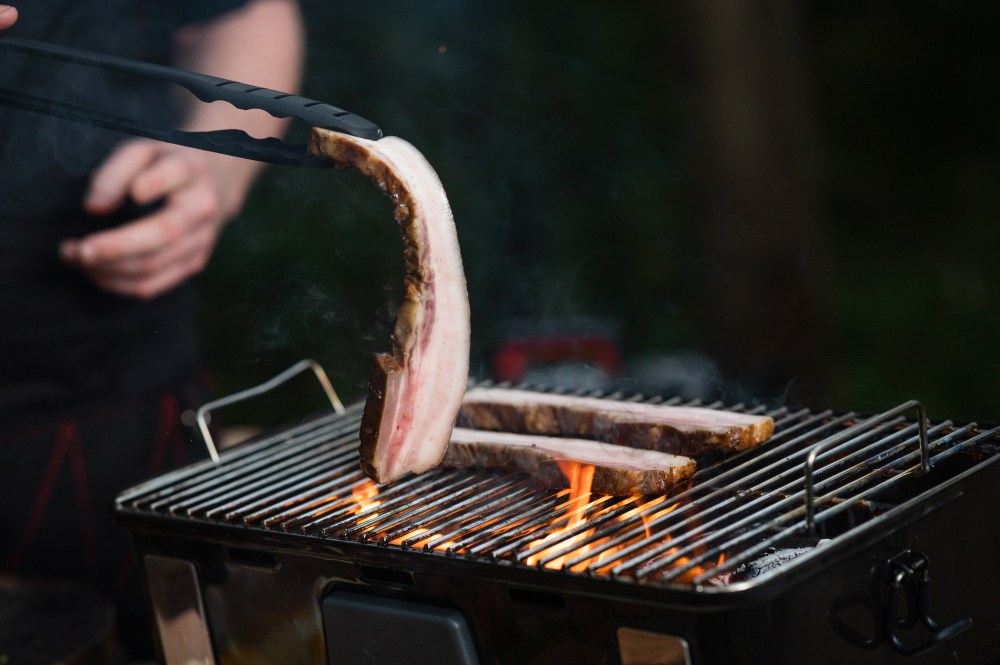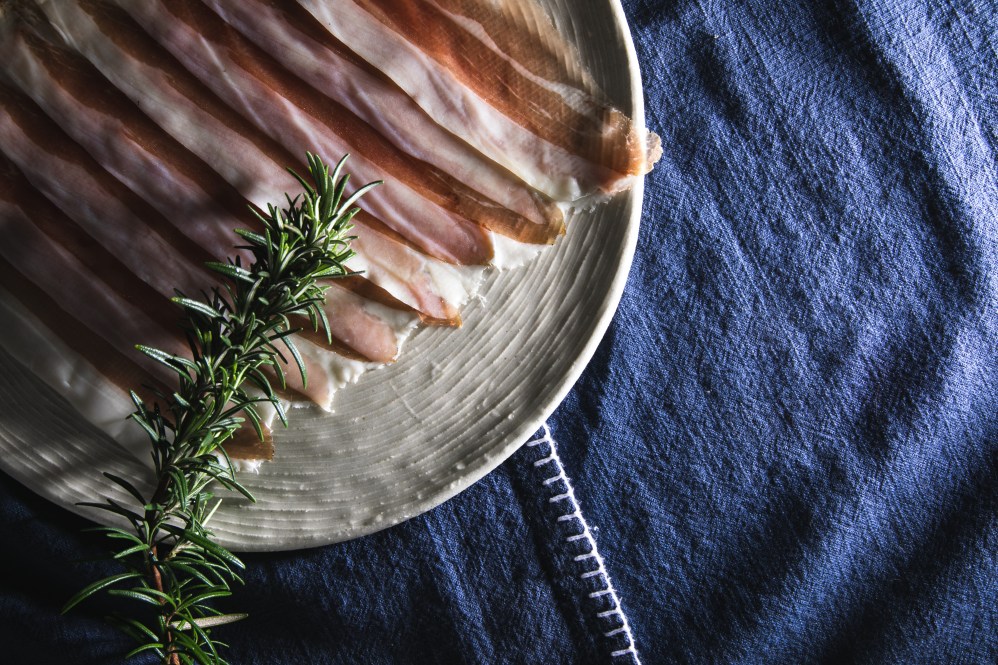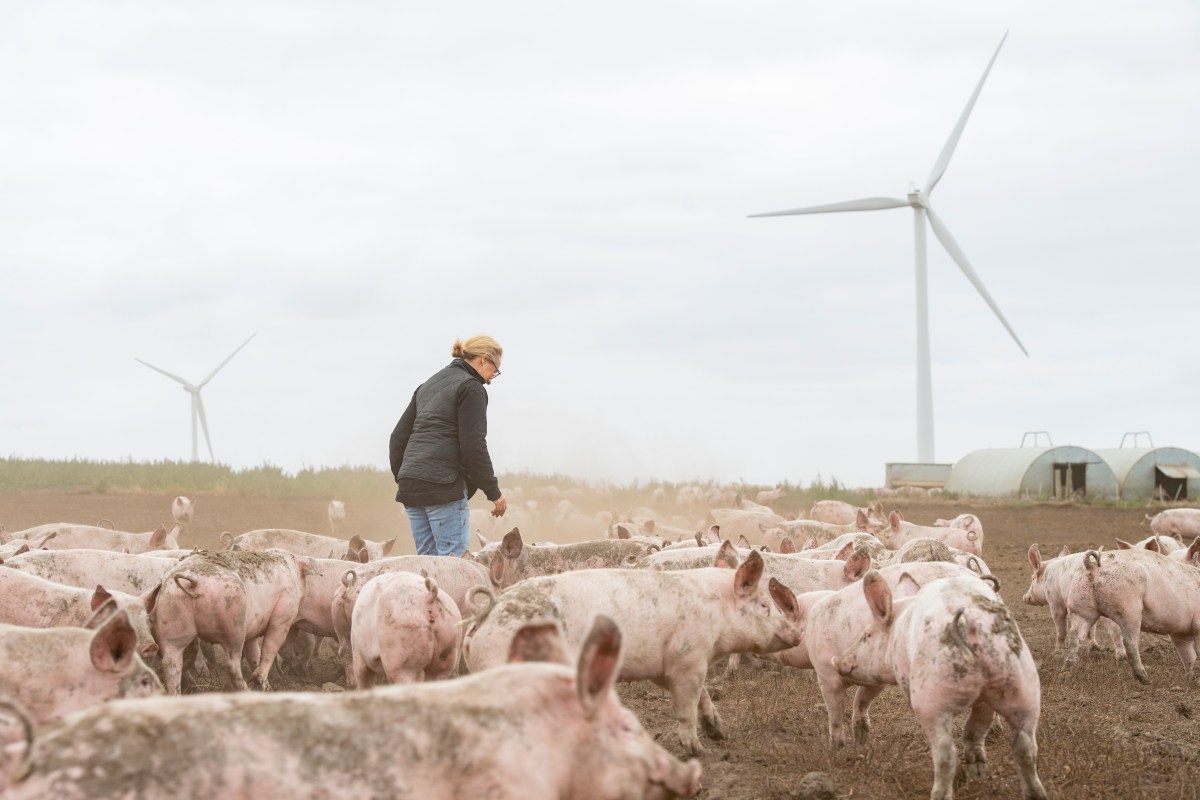There’s no doubt sustainability is an important topic in the hospitality sector. Here in Australia, the pork industry is leading the way when it comes to more ethical and environmentally conscious protein production. Chefs and operators are increasingly sourcing sustainable and ethical pork for many reasons from meeting customer expectations to cooking with a superior-quality meat with an unrivalled flavour profile.
To find out more about how sourcing sustainable and ethical pork translates to the plate, Hospitality speaks to Western Plains Pork CEO Judy Croagh, Chef and Restaurateur Adrian Richardson, and Salt Kitchen Charcuterie’s Mick Nunn.
Sustainable and ethical pork production has always been at the core of Western Plains Pork in Victoria’s Mount Mercer. “We are doing the same thing we’ve always done, and we continually try to improve everything we do,” says Judy Croagh.
Western Plains Pork implements an array of practices across its farm such as moving pigs to different sites every three years to help minimise the impact on the grounds as well as prevent pollution from the animals. Pig waste is used for compost, solar panels for energy, and the use of artificial growth agents or stimulants is avoided.
Western Plains Pork also places great importance on animal welfare and have an outdoor-bred environment. Strict training is provided to staff to ensure all pigs are treated well. “It’s always about our people, our pigs, and the environment within our business,” says Croagh. “Animal husbandry is everything … through the whole system, animal welfare is a priority.”
The farm’s unwavering commitment to animal welfare and consideration of the environment has caught the attention of many who are in pursuit of a greener approach to their work.

Chef Adrian Richardson from Melbourne’s La Luna Bistro and Bouvier Bar & Grill has been using Western Plains Pork for more than 20 years. “If people are prepared to pay a little bit more for a better-quality and more sustainable product now, the world will eventually become a better place,” he says.
Alongside the obvious environmental benefits, the chef believes it’s an essential requirement for venues to source sustainably and ethically when it comes to the proteins chefs cook with. “Consumers expect chefs to do their due diligence and make sure what they are serving is of the best quality,” says Richardson. “They are more aware of what they’re eating and there’s a lot of publicity about sustainability and the ethical treatment of animals.”
Richardson admits he doesn’t place importance on marketing his sustainable and ethical pork sourcing as he knows it’s an expectation. However, he does spend time educating staff on pork sourcing in case they are asked. “It’s not something I get out there and wave a flag around about,” he says. “So they [consumers] might not ask, but I do know they expect it.”
Richardson purchases whole pigs from Western Plains Pork which he uses to produce a range of smallgoods such as salami, capicola, lardo, pancetta, and prosciutto. “We use the entire animal to make products that we then sell for the rest of the year,” he says. “So, we’re self-sustainable when it comes to all our smallgoods.” Richardson also makes sausages, pork rillette, and terrines. “It’s an extremely versatile protein to use,” he says. “You can make so many different products out of it either fresh or cured.”
Quality is an added bonus of working with ethical proteins, and is attributed to a range of factors including the way the animals are treated during their lifespan, their environments, and not being exposed to stressful experiences before they are slaughtered. “If an animal has lived a good life roaming the fields, they’re happy and
grow properly, so they get the right amount of fat in them,” says Richardson. “The less stress the animal has, the better quality the meat is.”
Dark cuts from altered pH levels may be found on a protein and are a sign an animal hasn’t been treated well. “It [dark cuts] makes them really terrible to eat,” says Richardson. The chef has also found sustainable and ethical pork products to be firmer, have marbling, and be more consistent in size and flavour.
Mick Nunn from Delacombe’s Salt Kitchen Charcuterie in Victoria also uses Western
Plains Pork to make his handmade range of smallgoods. The majority of his clients work in the industry and ask questions about the proteins used to make the products. “I think chefs and restaurateurs are sourcing more information than they ever have on where products are being produced and how sustainable they are,” he says. Nunn says the interest has carried on to consumers, too. “There’s been an uptick because people want to know and understand provenance. Consumers, particularly post-Covid, are even more discerning about the production and sustainability of proteins.”
Western Plains Pork has a dedicated paddock for Salt Kitchen Charcuterie and grows larger pigs that are double the size of the others. Nunn uses each part of the pig, and says the meat determines Salt Kitchen’s product list. Scotch or neck muscle is used to make capocollo, with belly used to make streaky bacon and pancetta.
Nunn also uses pork in dry-cured products including a Noix de jambon (French single-muscle ham), dry-cured ham, and fiocco which is made from a small muscle in the back leg. Trims are utilised in products such as mortadella, salami, fresh sausages, mince, pâtés, and terrines.

Like Richardson, Nunn agrees sustainable and ethical practices implemented at farms have a big impact on the final product. “Sustainable production and healthy pigs translate to a quality and a consistency that is easily recognisable to a producer of salumi and charcuterie,” he says. “Certainly [the animals] being free-range is beneficial to the end product from a flavour, muscle structure, and fat content standpoint.”
Consciously sourcing sustainable proteins is something to be proud of, and Nunn promotes Western Plains Pork on product labels and marketing activity. “The quality and consistency of our raw product can be attributed to the practices used at the farm,” says Nunn. “It’s always been important for Salt Kitchen Charcuterie to align
ourselves with producers that can produce proteins that deliver on flavour.”
There’s no doubt sustainable proteins are the way of the future. “Sourcing products with a sustainable focus flows to the customer and creates a really good environment for the future,” says Croagh. “If the consumer is asking questions and the chefs are, too, it’s really positive.”
Richardson agrees and believes there is already a wider range of ethical and sustainable pork options on the market now. “Whether you want small, large, or even free-range organic producers — they’re all there,” he says. “You just have to Google or pick up the phone and you’ll be able to track them down.”
Connecting with farms directly to understand what they offer as well as to learn more about their farming practices is also a must. “Speak to the farm as much as you can,” says Nunn. “If you can get in contact with the source, it’s only going to be beneficial to be able to understand where your product is coming from.” Richardson hopes increased education will make sustainable and ethical pork production the norm. “The more we purchase these products, the more we reward the people who are doing the right thing.”

